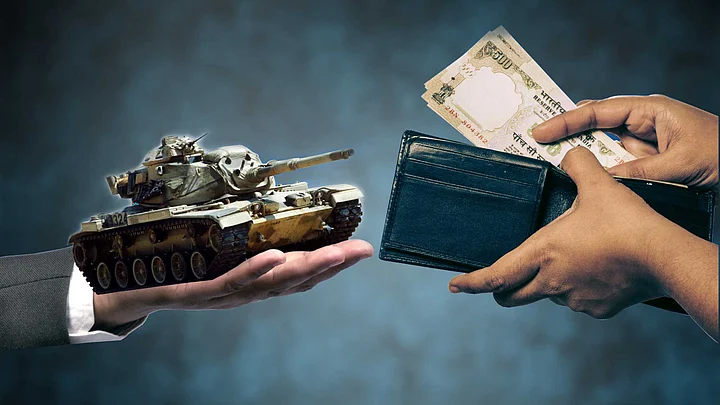The defence outlay of the annual Budget is usually announced by the Finance Minister in the latter half of his speech in parliament and is relatively predictable. A certain figure is announced – usually a marginal increase over the previous year – and a solemn rider added, that the country will always provide what is necessary for the ‘defence’ of the nation, should the exigency arise.
This year, for reasons not quite clear yet – the FM’s speech made no reference to the defence outlay – and the details had to be gleaned from the Budget document.
The summary is as follows as per the new budgetary format of classifying fiscal allocations for the Defence Ministry.
The total budget estimate (BE) for the Ministry of Defence (that caters to the civilian bureaucracy, armed forces, the DRDO, ordnance factories and pensions ) for FY15-16 allocated by the FM in end-February 2015 was Rs 3,10,079 crore. This was the budgeted estimate (BE) for the financial year (FY) that will end on 31 March 2016.
It is instructive to note that the revised expenditure (RE) – that is the amount actually spent in FY15-16 is Rs 2,93,579 crore. In other words, a sum of Rs 16,500 crore was unutilised from the overall BE allocation. Was this adroit but major ‘chop’ necessitated to balance the fiscal deficit ? One can only conjecture at this stage.
The disaggregation is revealing. In a very broad sense, the defence outlay is divided into two heads – revenue and capital. The former caters to the pay and allowances, training and annual expenditure for the entire personnel strength of the national defence edifice – which includes a mix of the uniformed and the civilian workforce. It also includes the pension bill.
Revenue Expenditure Rises But Capital Outlay Slashed
The BE for the capital head in FY15-16 was Rs 98, 175 crore and in the document tabled on Monday it was indicated that the RE for capital expenditure was Rs 85,112 crore.
In short – about Rs 13,000 crore (almost $2 billion) was unspent, and this at a time when the Indian military is in dire need of inventory modernisation and major platform induction.
The capital component is the critical fiscal vein for capacity building of the military and the trend lines again are instructive – albeit in a bleak manner. If one were to review just the last three years – the following figures are relevant. The Budget presented on Monday (29 February) provided the details of the actuals for FY14 – 15. The actual defence expenditure was Rs 2,01, 929 crore – against a BE of Rs 2,29,000 crore.
In that FY – namely 2014-15, the actual capital expenditure was Rs 83,074 crore. In the following fiscal – ie. 2015-16, the capital component at the BE stage was Rs 98,175 crore – and this was revised – hence the RE was revealed (on 29 February) to be Rs 85,112 crore. And for this year – ie 2016-17, the capital component of the defence allocation is budgeted – hence BE – at Rs 89,208 crore.
Departure From ‘Top Arms Importer’ Tag?
What does this mean in reality? India has the dubious distinction (as per 2015 data) of being the world’s largest importer of arms – so the capital component of the defence budget is being used to pay for arms that are being imported. This has to be paid in foreign exchange at the prevailing rate and hence indexing the capital component of the Indian defence Budget to the US dollar is again revealing.
The total capital component in FY14-15 works out to $13.9 billion; the RE of 2015-16 is $13. 6 billion ; and if the Indian rupee does not slide further against the US dollar – then the amount allocated as BE in the current fisc will be $13.03 billion.
In essence, the fiscal ability of the Indian Defence Ministry to redress military inventory gaps ( artillery guns, fighter aircraft and submarines for example) is shrinking in terms of forex value.
OROP’s Fiscal Impact Looms Large
However it must be conceded that given the personnel strength of the Indian military – the army in particular – the revenue expenditure has been steadily increasing and here the pension bill accounts for a significant amount. Defence civilian personnel also make for a wages and significant pension bill. The OROP when fully disbursed will also have to be catered for and hence the total revenue expenditure which was pegged at Rs. 2,08,465 crores (RE) has been increased to Rs. 2,50,711 (BE) in FY 2016-17.
Defence Allocation & Fiscal Tightening
Defence allocations and fiscal management remain very complex and belt-tightening has become the norm. This is an ingrained characteristic and the anomaly of a nation that still lives with the ignominy of open defecation allocating upwards of Rs 3,40,000 crore for defence is one of the many indicators that must cause deep political and societal discomfiture.
There are other aspects of the Budget that impinge on national security in a holistic manner – particularly in relation to the Home Ministry and internal security – and will be addressed in coming days. This is the first cut of an adroit fiscal trapeze that the FM Arun Jaitley has accomplished on Monday.
(The writer is a leading expert on strategic affairs. He is currently Director, Society for Policy Studies.)
(At The Quint, we question everything. Play an active role in shaping our journalism by becoming a member today.)
